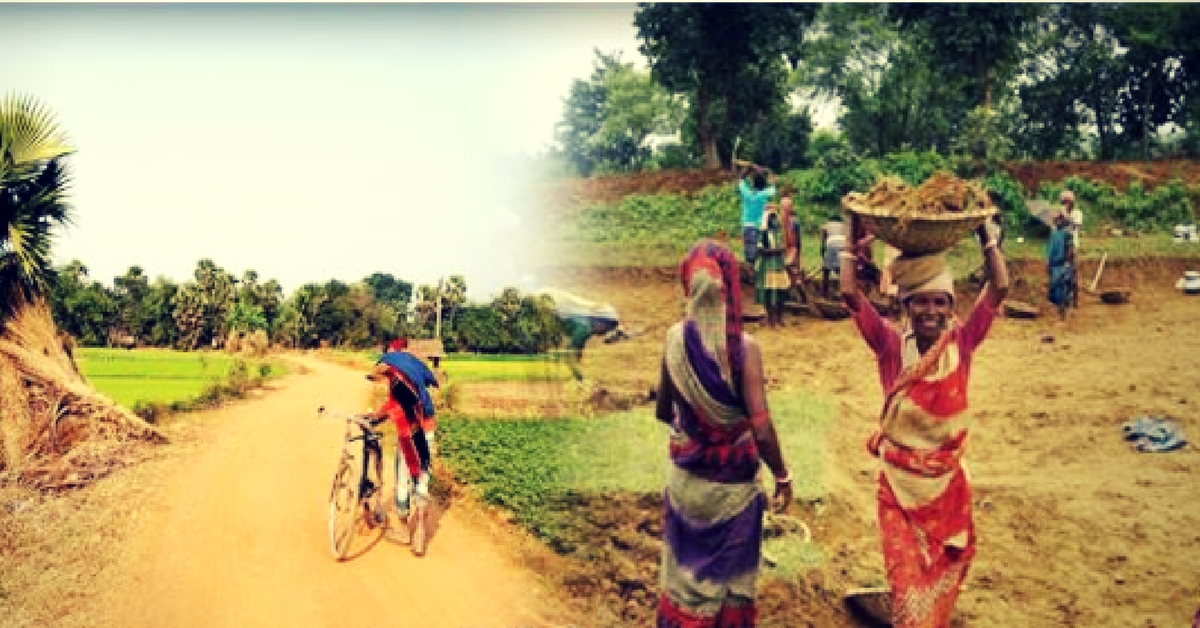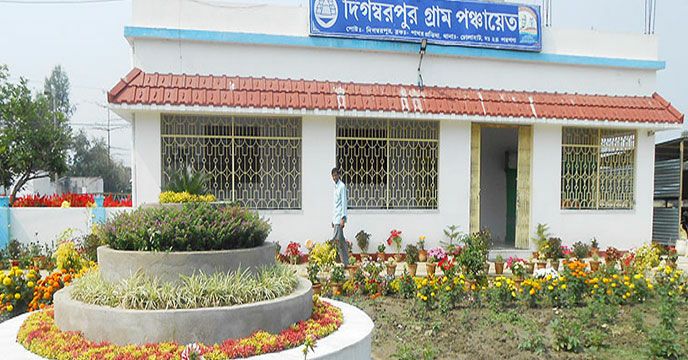Deep in the Sundarbans, India’s Best Gram Panchayat Is Driving Real Progress. Here’s How.
'Direct-to-home' drinking water supply, doorstep garbage collection, handicrafts from organic manure — this is the new normal in Digambarpur.

Deep in the interiors of Sunderbans in West Bengal lies the village of Digambarpur. Earlier this year, the Ministry of Panchayati Raj awarded the gram panchayat governing this village in South 24-Parganas district the first prize under its Gram Panchayat Vikas Yojana for instituting far-reaching changes. It was selected as the best among 2.5 lakh other gram panchayats from across India. The village has a population of 34,077 and covers an area of 49.5 sq. Km.
As a result of these far-reaching changes, the residents of this village now receive direct access to drinking water in their homes, besides being open defecation free and with concrete roads running through it.
How did this village manage to achieve so much?
“The credit goes to the villagers and the team of gram panchayat members and employees who spent time and energy on development. Around three years ago, we formed various teams, conducted surveys and mapped the area including social mapping. We identified the needs and roadblocks. Then we trained groups of villagers, mostly women, on issues such as sanitation, health and cleanliness. Then, for months, there were awareness campaigns, following which the projects were initiated,” said Rabindranath Bera, the Panchayat Pradhan (chief) to The Indian Express.
For overseeing these changes, Rabindranath received a cheque of Rs 20 lakh from the Ministry of Panchayati Raj for his contributions.
Also Read: Govt. Didn’t Act, So UP Villager Sells Goats To Build a Toilet!
With state funds allocated to the gram panchayat, assistance from non-profits working in the area and self-help groups (SHGs) operating in the village, the village has undergone radical changes. Take the example of the drinking water project it undertook with assistance from local non-profits to ensure residents have direct access to it in their homes.
On a 7,200 square feet plot of land donated by a resident, the gram panchayat built a 2 lakh litre-capacity overhead water tank (a deep tubewell with a pump set to draw the water out) in October 2016.
The resident on whose land the water tank was built, is now paid a monthly salary of Rs 3,500 by the gram panchayat for the upkeep of the equipment.
Besides, the panchayat has set up committees made up of residents to oversee other tube wells set up in their respective areas.
“It’s like living in a city. Earlier, we had carried water from tube wells, which produced a poor quality supply during the summer. The direct water supply has been a boon for us women. Many of us have even bought shower fittings,” says one resident to The Indian Express.

Another shining light of this village is its waste management project. In a bid to institute an efficient waste segregation system the gram panchayat distributes a set of two buckets to each household, school and health centre—one for liquid waste and the other for solid waste.
“We have provided households with two dustbins each – one for liquid waste another for solid waste. Every morning, the waste is collected and brought to a treatment centre where the waste is sorted, and then the bio-degradable ones are used to make organic fertilizer,” said Rabindranath.
Also Read: 15 Progressive Indian Villages That Will Make You Want to Ditch Your City Life!
What’s even more heartening about this project is that villagers pay the local gram panchayat for waste management. Households pay Rs 10 per month, higher secondary schools pay Rs 200 per month, primary schools pay Rs 50 per month and shops pay Rs 250 per month.
“Initially, it was difficult. People were not ready to pay Rs 50 per month for water to their homes or Rs 10 for the collection of garbage from their doorstep. It took us months. We held meetings and ultimately, they understood. Now, 400 households use the water, and more applications are pouring in every day. We supply 200 litres of water three times a day, which adds up to 6,000 litres a month,” says another resident of the village to the national publication.

Like any positive development-related story, women are once again at the heart of this village’s transformation. They took the bull by its horns in creating awareness among fellow villagers for various projects instituted in the village, besides monitoring the work of SHGs.
“We had been working for women empowerment long before it was in fashion. Hundreds of women among the population of about 30,000 here have been involved in various activities. Some women work in groups, helping others in varied activities from mushroom cultivation to microfinance. We provide microloans for interest of as low as 0.5%. There is also a milk cooperative which collects the milk produced in the GP and sell it to the market,” Sampa Bairagi, secretary of Anandadhara, the women’s committee, told DNA.
The village also has a cooperative called the Digambarpur Sarada Sangh Prathamik Bahumukhi Samabay Samity Ltd, which operates and markets a whole host of SHG-run projects ranging from mushroom cultivation to production of organic fertilisers. Among the 6,214 families residing in the village, 4,649 are involved in SHGs and co-operatives, reports The Indian Express.
On the subject of open defecation, villagers talk of how the Pradhan would earlier survey the village on his bike at 1.30 am to check if anyone was defecating the open and asking them for doing so. Now the entire village is equipped with toilets with a functional sewage system.
(Edited By Vinayak Hegde)
Like this story? Or have something to share? Write to us: [email protected], or connect with us on Facebook and Twitter.
NEW: Click here to get positive news on WhatsApp!
If you found our stories insightful, informative, or even just enjoyable, we invite you to consider making a voluntary payment to support the work we do at The Better India. Your contribution helps us continue producing quality content that educates, inspires, and drives positive change.
Choose one of the payment options below for your contribution-
By paying for the stories you value, you directly contribute to sustaining our efforts focused on making a difference in the world. Together, let's ensure that impactful stories continue to be told and shared, enriching lives and communities alike.
Thank you for your support. Here are some frequently asked questions you might find helpful to know why you are contributing?













